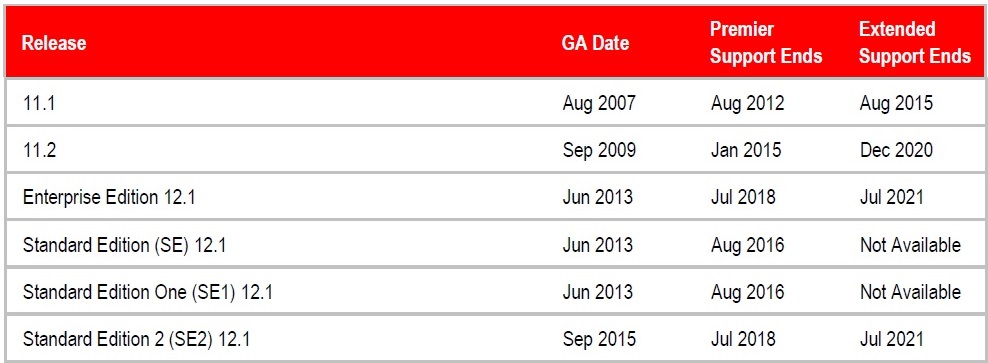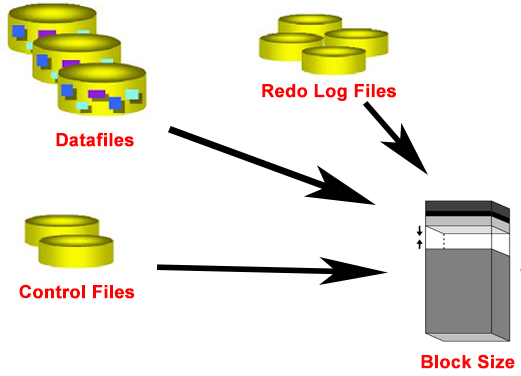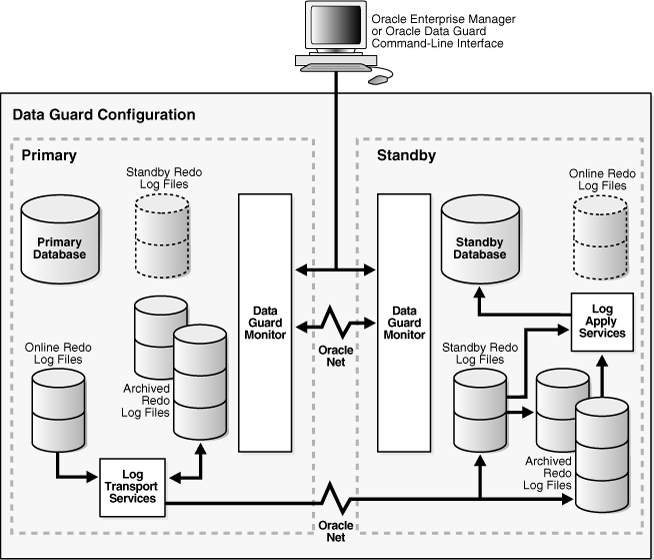Archive for the ‘ORACLE Database’ Category
Oracle Zero Data Loss Recovery Appliance – a completely new solution for Oracle databases
Montag, April 4th, 2016Oracle Lifetime Support Policies – Database Releases
Freitag, März 25th, 2016Oracle Private Cloud Appliance (PCA) – is a simple converged infrastructure designed for quick deployment of cloud models
Sonntag, März 6th, 2016Oracle Database 12c – block size of control files and redo log files are not same as default block size of a oracle database
Freitag, März 4th, 2016Oracle TimesTen In-Memory Database (TimesTen) – is a full-featured, memory-optimized, relational database with persistence and recoverability
Freitag, Februar 26th, 2016![]() Oracle TimesTen In-Memory Database (TimesTen) delivers real-time performance by changing the assumptions around where data resides at runtime. By managing data in memory, and optimizing data structures and access algorithms accordingly, database operations execute with maximum efficiency, achieving dramatic gains in responsiveness and throughput, even compared to a fully cached disk-based RDBMS. TimesTen can be embedded within the applications to further improve performance of database operations by eliminating inter-process communication and network Overheads
Oracle TimesTen In-Memory Database (TimesTen) delivers real-time performance by changing the assumptions around where data resides at runtime. By managing data in memory, and optimizing data structures and access algorithms accordingly, database operations execute with maximum efficiency, achieving dramatic gains in responsiveness and throughput, even compared to a fully cached disk-based RDBMS. TimesTen can be embedded within the applications to further improve performance of database operations by eliminating inter-process communication and network Overheads
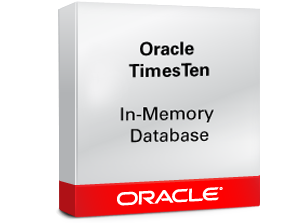
Oracle Data Guard Broker 12c – is a distributed management framework that automates and centralizes the creation, maintenance, and monitoring of Data Guard configurations
Mittwoch, Januar 20th, 2016Oracle Private Cloud Appliance (PCA) – is an integrated infrastructure system engineered to enable rapid deployment of converged compute, network, and storage technologies for hosting applications or workloads on a guest OS
Montag, Januar 11th, 2016![]() Oracle Private Cloud Appliance (PCA) – is a simple converged infrastructure designed for quick deployment of cloud models and consolidation of Microsoft Windows or Linux applications
Oracle Private Cloud Appliance (PCA) – is a simple converged infrastructure designed for quick deployment of cloud models and consolidation of Microsoft Windows or Linux applications
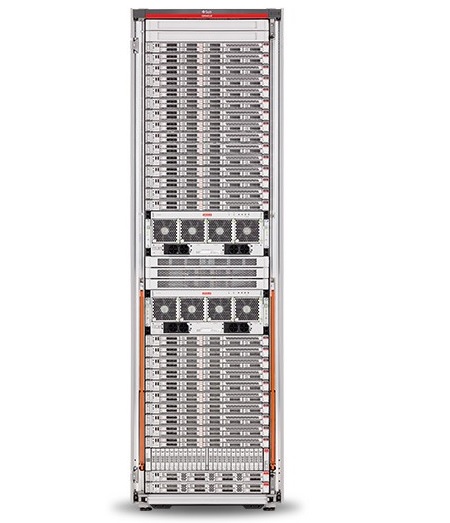
Oracle Database 11g – Standby Datenbank in „5 Minuten“
Mittwoch, Dezember 30th, 2015 Oracle Database 11g – Standby Datenbank in „5 Minuten“
Oracle Database 11g – Standby Datenbank in „5 Minuten“
Oracle Cloud Platform Services – announcement by Larry Ellison
Sonntag, Dezember 6th, 2015Oracle Database Cloud Backup Service – is a secure, scalable, on-demand storage solution for backing up your databases to the cloud
Donnerstag, Dezember 3rd, 2015Oracle verlagert den EU-Support nach Rumänien – demnach sollen bereits Anfang 2016 alle anderen europäischen Standorte aufgelöst sein
Dienstag, November 24th, 2015
Oracle Standard Edition (SE) and Standard Edition One (SE1) – are replaced by Oracle Database 12c Standard Edition 2
Dienstag, September 8th, 2015 Oracle Database Standard Edition 2 may only be licensed on servers that have a maximum capacity of 2 sockets. When used with Oracle Real Application Clusters – Oracle Database Standard Edition 2 may only be licensed on a maximum of 2 one-socket servers. In addition notwithstanding any provision in Your Oracle license agreement to the contrary each Oracle Database Standard Edition 2 database may use a maximum of 16 CPU threads at any time. When used with Oracle Real Application Clusters each Oracle Database Standard Edition 2 database may use a maximum of 8 CPU threads per instance at any time. The minimums when licensing by Named User Plus (NUP) metric are 10 NUP licenses per Server
Oracle Database Standard Edition 2 may only be licensed on servers that have a maximum capacity of 2 sockets. When used with Oracle Real Application Clusters – Oracle Database Standard Edition 2 may only be licensed on a maximum of 2 one-socket servers. In addition notwithstanding any provision in Your Oracle license agreement to the contrary each Oracle Database Standard Edition 2 database may use a maximum of 16 CPU threads at any time. When used with Oracle Real Application Clusters each Oracle Database Standard Edition 2 database may use a maximum of 8 CPU threads per instance at any time. The minimums when licensing by Named User Plus (NUP) metric are 10 NUP licenses per Server
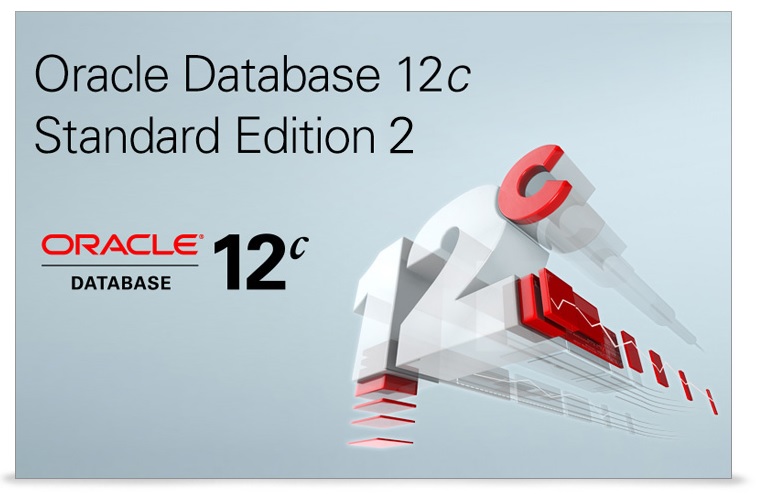
Oracle Fine Grained Auditing (FGA) – that is used to capture the details of the select only queries issued by users
Freitag, Dezember 12th, 2014 Oracle Fine Grained Auditing (FGA) gives a new edge to the auditing tools available to the DBA to satisfy the requirements of a number of compliance bodies such as HIPAA. Under the HIPAA law, the data selected from the tables should also be audited to record the tracks of who is accessing what information, particularly sensitive data such as Patient Health Information (PHI), among others – Oracle FGA addresses this issue
Oracle Fine Grained Auditing (FGA) gives a new edge to the auditing tools available to the DBA to satisfy the requirements of a number of compliance bodies such as HIPAA. Under the HIPAA law, the data selected from the tables should also be audited to record the tracks of who is accessing what information, particularly sensitive data such as Patient Health Information (PHI), among others – Oracle FGA addresses this issue
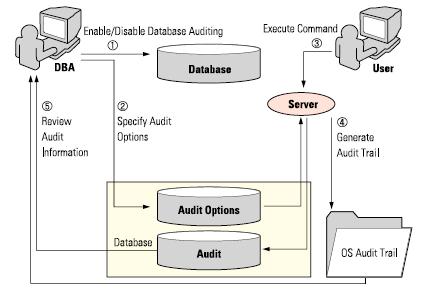
Oracle Database – special characters in passwords
Dienstag, November 25th, 2014Oracle passwords can be from 1 to 30 characters – the first character in an Oracle password must be a letter – subsequent characters may be letters, numbers, or the symbols # (pound sign), $ (dollar sign) or _ (underscore)
If the Oracle password is not enclosed in quotes then it can include any letter, any digit, “_”, “#” or “$” characters. If on the other Hand you enclose the password in quotes then you can use any character in any position
Oracle passwords are not case sensitive so the valid alphabet is reduced by 26 characters
